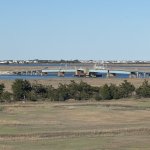NEWARK – Federal Magistrate Judge Cathy L. Waldor’s Oct. 17 temporary restraining order was considered to be of “national significance” by a Cape May County tuna fisherman’s defense attorney.
“This is the first time ever in the nation this has happened,” Atlantic City Attorney William J. Hughes Jr. told the Herald Oct. 18 of the order.
Federal agents from the National Oceanic and Atmospheric Administration (NOAA) and federally-deputized state conservation agents and defense counsel’s private investigator were ordered not to have contact with two of the government’s confidential informants.
Hughes is defending Daniel Archibald, a Lower Township commercial fisherman, against the government’s charge that alleges, while tuna fishing aboard the Capt. Bob, he fired a rifle at a pilot whale in November 2011.
A 740-pound pilot whale was found beached in Allenhurst, Monmouth County and died shortly after that.
A .30-caliber bullet was lodged in its jaw. That wound, the government claims, caused an infection that led to the whale’s death a month after the incident. Hughes previously disputed that claim, and stressed that the vessel on which Archibald worked was licensed for Atlantic long-time tuna fishing. On such vessels, he said, it is usual to have firearms aboard in the event a shark is hooked.
Archibald was charged in a complaint with one count of violating the Marine Mammal Protection Act of 1972. The case became public Feb. 19, 2015 in a release by U.S. Attorney Paul Fishman. Archibald appeared in federal court in Newark and was released on $10,000 unsecured bond.
If convicted, he faces a year in prison and a mandatory fine of $100,000.
Hughes supplied the Herald with documents filed with the court in which confidential informants told the defense’s private investigator, a retired FBI agent, that the federal agents threatened them, but only when their recording device was turned off.
Those informants, “CI-1 and CI-2, claim that they cooperated with federal law enforcement because they were threatened and harassed,” according to the record. What the threats included will be made known at the hearing, Hughes stated.
“The government’s correspondence is troubling on many levels,” Hughes wrote. “Starting with its unwillingness or inability to appreciate the nature of quandary in which the government lawyers have willingly placed themselves, and ending with the government’s failure to present a balanced and accurate analysis of the state of the law and the facts of the current circumstances,” he continued.
Hughes’ Application for the Order to Show Cause “demonstrates, the Government’s confidential informants – in their own words – claimed repeatedly that they were harassed and threatened by NOAA Special Agents.
“In essence, they stated that NOAA Special Agents and federally deputized NJ Conservation Officers threatened to revoke their rare horseshoe crab harvesting permit for minor violations (an undersized flounder in the trap) if CI-1 and CI-2 did not become Government Cooperating Witnesses.”
In language, coarse at times, the informants spoke to the defense investigator. He wrote, “This was not just an off-the-cuff statement by one of the government’s two confidential informants: it was made on more than one occasion and was corroborated by the government’s other confidential informants:
“JC: I don’t really remember, but I know they kept harassing the [expletive] out of us, harassing us, calling us like with those [expletive] threats and it was, we told them at one point we weren’t cooperating and they said we’re going to [expletive] jail then. Yeah, they did say that, oh yeah, they’d put us in jail.”
The alleged threats were to have the informants go aboard the Capt. Bob without the authority of a search warrant.
Hughes wrote, “Further, the government’s most recent submission appears to concede that, contrary to NOAA Special Agent Jason Couse’s official report, there was never a female aboard the confidential informant’s vessel.
“Although the government couches this concession in terms that the confidential information now cannot remember, his reaction was different when he first learned about the NOAA Special Agent’s statements:
“(Private investigator) KB: Well, you must have made an inference cause you know what, you’re going on the boat, here’s what you told them, if it’s true, tell me: you were set…(to)…wind up going on…you were changing clothes, probably had to go on your boat because you had some female on this boat…
“JC: Huh?
“KB: This is what’s in the memo, okay. There was a female on your boat.
“JC: First of all there ain’t never been a, that what they’re saying?
“KB: That’s what they’re saying. Yeah.
“BC: That’s actually [expletive]. That’s 100 percent [expletive]. There wouldn’t be a female on the boat.
“KB: Well what they’re trying to say is you were on the boat because of this, not because the government ordered you to be on the boat or asked you to go on the boat and look around.
“BC: Oh they’re [expletive] lying. You know, the only time, specifically, the only time I don’t never really go on the boat at all…”
Hughes continued, “The government’s own witness, whose statements were the subject of the report, is adamant that the statements attributed to him in the report were not made.
“These are the words of the government’s own witnesses in a criminal investigation and criminal proceeding, and those government witnesses, not the defense, are claiming that federal law enforcement agents engaged in conduct which, if true, constitutes violations of federal criminal laws.
“These prosecutors are responsible for investigating and enforcing those laws. Instead of telling the court that there should be an appropriate inquiry by this court and that the U.S. Attorney’s Office will follow its own protocols and make the appropriate referrals in accordance with DOJ (Department of Justice) regulations, the U.S. Attorney’s Office tells this court that it has spoken with NOAA Special Agent Couse, and they don’t see a problem.
“…The U.S. Attorney’s Office’s failure to recognize and appreciate the inherent conflict and problem with their approach and handling of this situation shades their faulty and incomplete legal arguments before this court.
“That is, in its effort to diffuse their situation and prevent a thorough and independent inquiry of potential federal crimes by federal law enforcement, the government has failed to present the complete legal picture to this court.”
As part of Hughes’ original 70-page brief to the court, he noted that the NOAA agent obtained a search warrant because, in part, he told the court that a photo of ammunition on Archibald’s Facebook page around the time of the whale shooting was the same type of ammo that is used by the Mosin Nagant rifle and like the bullet that was found in the whale.
“In fact, the picture described by the NOAA special agent depicted ammo that cannot physically be loaded into a Mosin Nagant rifle. The picture explicitly shows an “extractor groove” on each of the cartridges, and this type of ammo cannot be physically inserted into a Mosin Nagant rifle.
“Further, in a subsequent search warrant affidavit, the NOAA special agent said a test bullet fired from the Mosin Nagan was similar to the one found in the pilot whale.
“In fact, the ballistics test by the Bureau of Alcohol Tobacco and Firearms (BATF) found the ballistic test inconclusive and the BATF issued a subsequent report stating that the bullet from the pilot whale and the test bullet came from different sources.
“NOAA special agents never informed the court of these facts.”
An evidentiary hearing is the next step in Archibald’s case.
Cape May County – Thank god for Commissioner Morey, he is the only one willing to speak up for the residents and against the Desiderio controlled board and attorney. Lenny doesn’t want to talk about anything in the…








